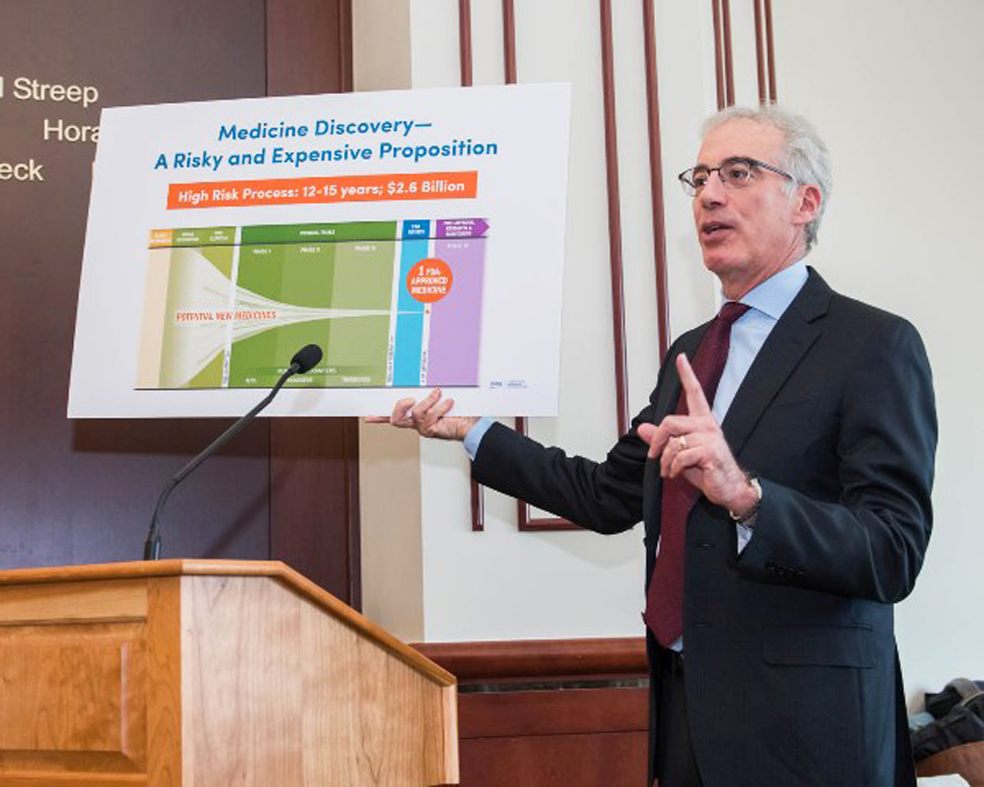Stamford the hub for Fairfield County’s biotech sector
Fairfield County”™s biotech community is thriving, thanks almost entirely to Stamford.
Connecticut”™s bioscience industry consists primarily of two highly specialized subsectors: medical devices and equipment and drugs and pharmaceuticals, according to Paul Pescatello, senior counsel and executive director of the Connecticut Business and Industry Association”™s Connecticut Bioscience Growth Council. He said updated figures on the state”™s biotech sector are expected this spring from the New England Biotech Association, which he serves as president and CEO.

Citing the regional association”™s 2014 figures, Pescatello said Connecticut”™s universities spent $727 million in bioscience research and development that year. The life sciences made up 79 percent of all academic R&D in the state, compared with a 61 percent national average.
In Stamford, Sema4, a health information and genomic testing company, and Cara Therapeutics, which develops and commercializes new medications to treat pain, are leading the way.
Spun off last year from Mount Sinai Health System in New York City, which remains its sole investor, Sema4 “specializes in the right combination of life science, biotech and information technology, which is really on the cutting edge right now,” Pescatello said. “They could be a huge breakout company.”
The company after its spinoff opened a 28,000-square-foot office at 333 Ludlow St. and employs about 75 people. Sema4 officials have said it expects to nearly double its workforce this year.
This month, Sema4 unveiled a saliva test for newborns that can search for 193 genetic diseases. The standard newborn screening test, which requires drawing a small blood sample from the baby”™s heel, looks for a minimum of 34 disorders.
“Until now, families have been likely to be caught off guard by these early-onset diseases and prognosis is often poor by the time symptoms have manifested,” said Sema4 founder and CEO Eric Schadt. “Thanks to breakthroughs in science and medicine, we can now identify babies at risk for these broader sets of diseases and deliver interventions ”” sometimes as simple as vitamin supplements ”” in time to make a real difference.”
Founded in 2004 and headquartered at 107 Elm St. in Stamford, Cara Therapeutics in late January announced it had begun a phase three clinical trial on human patients of Korsuva, an injectable medicine for hemodialysis patients suffering from moderate-to-severe pruritis associated with chronic kidney disease. It has been particularly keen on expanding its presence in kidney disease therapies.
But Cara has had a rough go of it financially as it develops drug products for the market. It reported a net loss of $12.4 million in the third quarter of 2017, compared with a net loss of $11.5 million in the previous year”™s third quarter. It reported a $9.3 million net loss in last year”™s second quarter and a $22.2 million loss in the first quarter.
Pescatello said Purdue Pharma in Stamford is another key player in the biotech sector. Although the company and several of its competitors face numerous and mounting lawsuits from municipalities nationwide for their marketing of opioids like OxyContin, “They”™re doing a lot of really good research around other, nonopioid pain medications,” Pescatello said.
Headquartered at 201 Tresser Blvd., Purdue Pharma recently announced the funding of three grants for investigator research to develop “clinically relevant and useful tools” to assist in the assessment of chronic pain, including virtual reality technology.
Pescatello said the opioid-related lawsuits generally miss that “there are different sides to the issue. The fact is that there is a real need for these medications. Health practitioners, hospitals and doctors see the need for them in treating pain.”
Along with New Haven, Stamford remains the state”™s major location for biotech, “as it is for so many industries,” Pescatello said. Its proximity to New York City and Boston and the relative ease of transportation to the city will likely continue to contribute to that status, he said.
As the Connecticut Business & Industry Association”™s registered lobbyist, Pescatello is also keeping a close eye on the Connecticut legislature, whose regular session convened on Feb. 7.
“Attracting more residents and companies is of course important for all of us,” he said. “The number one thing for us, which could gain some traction this year, is attracting more venture capital to the state. In the biotech world, venture capitalists want to be near the companies they”™re funding. The more venture capital we can bring into Stamford or Connecticut, the more (biotech) companies, because then they can walk into their labs with funding.”